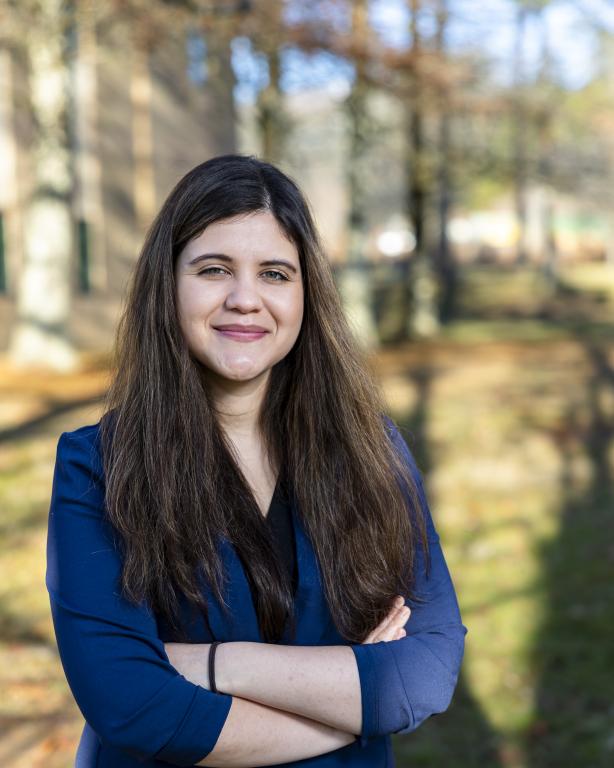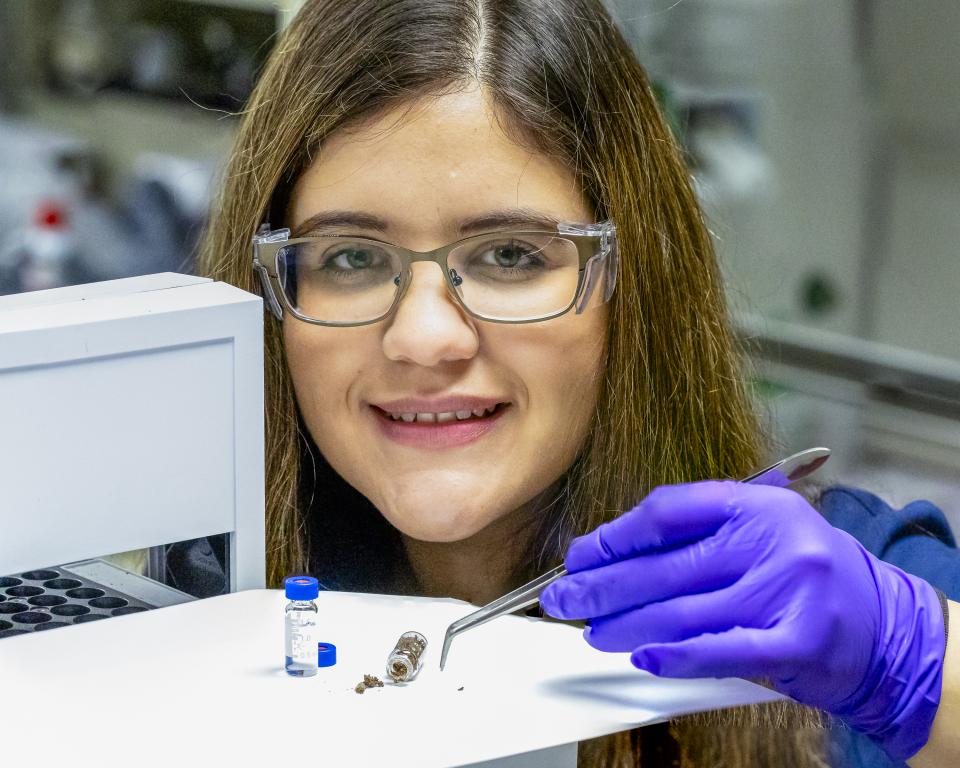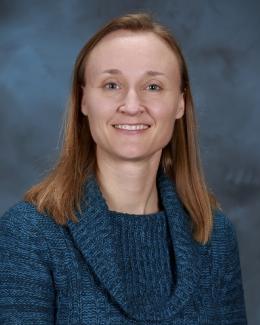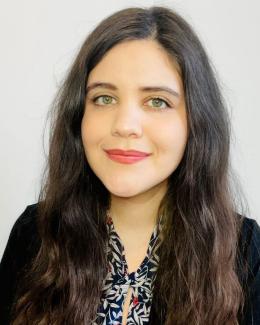
Much as the gut microbiome is increasingly linked in human health, so the soil microbiome is key to the fate of plants. At Oak Ridge National Laboratory, Ilenne Del Valle is combining her expertise in soil science and synthetic biology to devise technologies like biosensors and artificial soils that can yield important clues from the soil environment to encourage climate-resilient ecosystems.
As part of her work for the DOE Secure Ecosystem Engineering and Design Scientific Focus Area, or SEED SFA, Del Valle is focused on understanding how microbes get established in the soil environment around plant roots, known as the rhizosphere. She and her colleagues in the lab’s Biosciences Division have an end goal of engineering natural ecosystems for resilience, with a focus on bioenergy from nonfood plants and increasing the amount of greenhouse gases locked away in plants and soils.
“For example, if we want to develop a soil probiotic that has a functional impact on plants, we need to know how to engineer those probiotics for maximum effectiveness under different field conditions,” Del Valle said.
She developed a biosensing system in graduate school that she’s improving on today at ORNL to better understand the soil microbiome — the form and function of the microbial life there and how the organisms influence plants. Biosensors typically developed for microbes result in a visible signal, but that doesn’t work in the dark soil environment. Del Valle is instead using synthetic biology tools to create bacteria that give off certain gases when they detect an environmental input of interest.
The gases diffuse out of the soil environment, and the chemicals are measured using specialized instruments such as gas chromatography-mass spectrometry. The microbes can be engineered to produce indicator gases in response to an environmental stressor, a signal from the plant or pathogen in the soil. “Basically, I make bacteria be gassy so they can tell me what they’re experiencing in the soil,” she said.
Del Valle is also working on artificial soils to better mimic conditions present in natural soil environments. The challenge is that soil is complex and variable. From one soil structure to another, pH level can be eight times lower or higher, she noted.
“I wanted to develop synthetic soils that we can use in greenhouse studies. I start with a quartz base and mix ingredients to reproduce the texture, their mineral content, pH and organic matter of natural soils. I have a method to aggregate all that together to mimic how a soil looks. It works basically like a cookie recipe for soils,” Del Valle said.
When used in a greenhouse environment, the synthetic soils allow scientists to change one physical or chemical property at a time and study how that variable affects plant-microbe interactions. “This lets us conduct larger-scale experiments in soil, but in controlled, laboratory conditions,” Del Valle added. “In terms of scale and complexity, the artificial soils are a step up from a flask or a petri dish and microfluidic devices such as our rhizosphere on a chip technology,” she said.

She’s also working with synthetic biology colleagues at ORNL to refine CRISPR-Cas9 gene editing tools to understand how different genetic factors influence microbial establishment and spread in soils at a genome-wide level.
Much of her work is supported by the SEED SFA as well as the Plant-Microbe Interfaces SFA, both led by ORNL. She also works with ORNL colleagues on the ENIGMA project, or Ecosystems and Networks Integrated with Genes & Molecular Assemblies, led by Lawrence Berkeley National Laboratory. All of the projects have a common thread: pursuing a better understanding of how microbial communities affect critical processes in ecosystems.
“My goal is to design new synthetic biology tools to study microbes in their natural environment and engineer them to aid ecosystem functioning safely and reliably in the field,” she said.
Del Valle enjoys working in the interdisciplinary environment at ORNL. “I get exposed to a lot of different, exciting science, and it helps us develop new approaches to bridge knowledge gaps,” she said.
She was first hired as a postdoctoral researcher in 2021 during what she describes as a challenging time due to the pandemic, but also an exciting one as her group leader, Carrie Eckert, was setting up a new synthetic biology lab. “I got to contribute to the lab’s setup and had great training on ORNL’s business systems as we purchased equipment and established protocols and plans,” she said. Del Valle was hired as staff two years later.
“Carrie gave me a lot of flexibility to explore my ideas here, and the opportunity to work on different types of projects,” Del Valle said.
Falling in love with science
Del Valle grew up in Chile and credits her mother, a college professor who specialized in parasitology, for sparking her interest in biology. “When I was little, she would always show me the biology of all the bugs,” Del Valle said. This included her mother’s community volunteer work removing head lice from children. “She taught me to look to the science of my experiences,” Del Valle said. Her sister, an engineer, encouraged her to take an applied focus to her work as well.
Del Valle studied biochemistry as an undergraduate at the Pontificia Universidad Católica de Chile. During her time there, she participated in a study abroad program at Georgia Tech, where she had her first direct research experiences, studying amyloids and the underpinnings of neurological disorders.
Her career-defining experience came soon after as she attended Chile’s first synthetic biology workshop and enjoyed the lectures and discussions. That experience led to Del Valle participating in an event called iGEM — the International Genetically Engineered Machine Competition — in Boston. “It was a very self-driven student competition, and we were challenged just getting funds to buy reagents for our experiment. But it was an amazing time, and afterward I knew I wanted to come to the U.S. for my Ph.D. There was no going back.”
She worked as a lab technician in Chile to save money for graduate school and spent time helping set up the college’s first synthetic biology lab. Del Valle was later accepted into the Systems, Synthetic and Physical Biology Program at Rice University in Houston, Texas, where she continued to study synthetic biology, microbiology, and soil and analytical chemistry.
Building resilience to disaster
As she pursued her scientific studies, Del Valle had plenty of life lessons too, surviving natural disasters and working to help her communities heal. She had just started college in 2010 when central Chile was hit with an 8.8 magnitude earthquake and resulting tsunami. “We didn’t have water or electricity for weeks. It was a frightening and very humbling time,” she said.
The experience shaped her response to the damage from Hurricane Harvey, which blew ashore as a category 4 storm in Houston in 2017 while Del Valle was attending Rice. The storm left tens of thousands of residents homeless after severe flooding. She volunteered in homeless shelters after the storm. “I had been on the other side of that kind of event and knew what it was like to need help. I wanted to give back,” Del Valle said.
Del Valle continues to help her community, these days with an eye to encouraging and mentoring young scientists. She volunteers as a judge for a competition similar to the one she participated in years ago. But this event, the Global Open Synthetic Biology Competition, is held online and is free, and that widens the opportunity for underrepresented scientists in particular.
“There are a lot of young people who don’t have the resources to compete, and this event gives them a research experience that can lead to opportunities for further education,” Del Valle said. While the contest has an experimental track that requires the purchase of materials, it also hosts a theoretical track that lets students propose a project and then be evaluated on their proposed design. It’s judged by experts in their field and represents a great networking opportunity as well, she added.
Her advice for young scientists? “Think outside the box. See how you can take knowledge from different fields to make your research unique — to find a different approach to solve challenges.”
“It’s also important to tell the younger generation not to give up, and this is especially true for underrepresented minorities,” Del Valle said.
UT-Battelle manages ORNL for DOE’s Office of Science, the single largest supporter of basic research in the physical sciences in the U.S. The Office of Science is working to address some of the most pressing challenges of our time. For more information, please visit https://energy.gov/science. — Stephanie Seay



